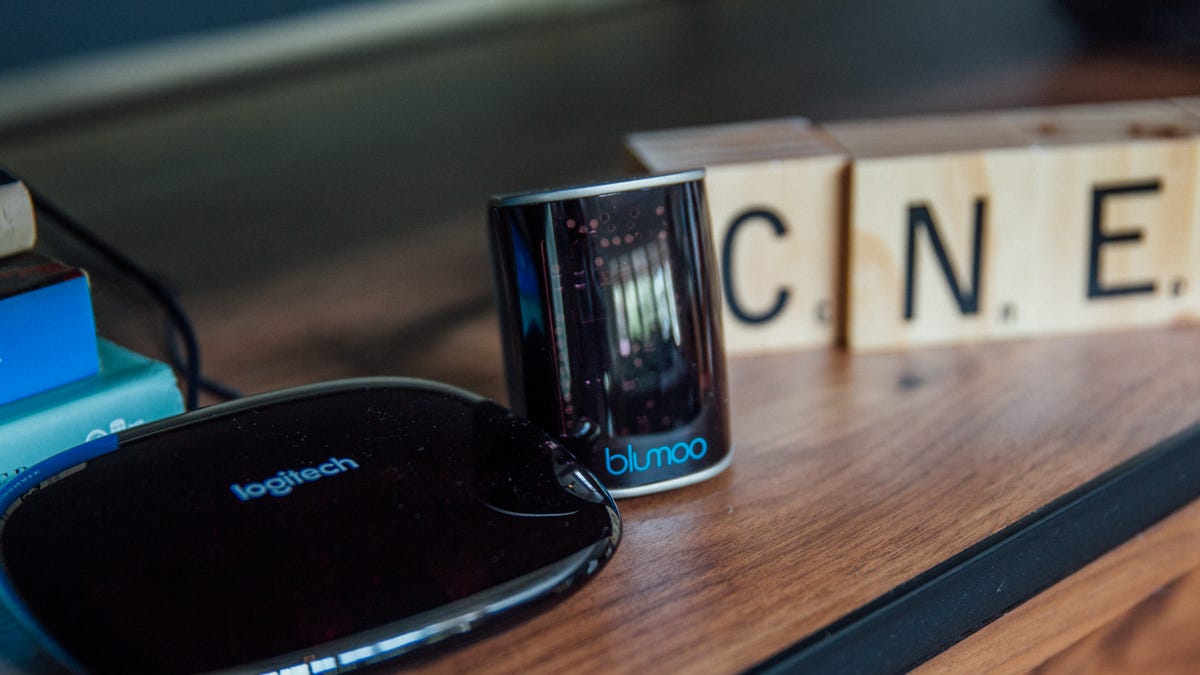The smart home could make connected couch potatoes of us all
Wondering what tricks the smart home can bring to your entertainment center -- and whether or not any of them are worth it? Us too.

The smart home is all about better in-home experiences -- the comfort of smart climate control, for instance, or the peace of mind you'll get with a good smart security system. But what can can the connected living space bring to the table as far as entertainment is concerned?
That's what we want to find out.
Home entertainment tech seems ready for prime time, or at least close to it. After all, more and more homes are using Internet-connected TV sets, and universal remotes keep getting smarter and more powerful. Entertainment-friendly smart home categories like voice control and connected lighting continue to grow, too, and bring new possibilities with them.
We'll spend the next week trying out various gadgets in the CNET Smart Home, our living lab for testing connected home tech. For now, let's get a sense of what we're in for with a look at some of our options.
Smart ambiance, smarter controls
SyFy's "12 Monkeys" synced up with color-changing Philips Hue LEDs.
Let's start with the TV. Content providers have been looking for ways of smartening up your viewing experience for years now, with things like "second screen experiences" you can follow during TV broadcasts or personalized fantasy football scores that show up on-screen during game days.
You'll find connected lighting trickery in the mix, too. Last year at CNET, a few of my colleagues and I tested out an integration between Philips and SyFy that synced up color-changing Hue LEDs with the TV series "12 Monkeys." It was an interesting experience, but not one that left me rushing out to buy color-changing mood lighting of my own.
Smart bias lighting seems worth testing out.
Still, there's at least some potential here -- especially if Philips can bring more content options into play. Select TV series are one thing, but how about video games, where immersion is even more important? And how about color-changing ambiance for high-profile live events? I know that I'd be sold if Hue bulbs could sync up with the broadcast at my next Oscars party. And dare I suggest a Hue-powered Super Bowl? Make it happen, Philips!
There also might be opportunity for entertainment-minded smart lighting that's a little more practical. For instance, installing bias lighting behind your TV set or monitor is a great way to enhance perceived picture quality and reduce eye strain. Syncing those bias lights up with a smart entertainment control system like Logitech Harmony would let you turn them on and off right from your TV remote, or let you program them to turn on automatically when it's dark out, or when the TV is on.
Blumoo's entertainment control gadget will soon sync up with Amazon's Alexa.
Better still would be to sync those TV-centric smarts up with a larger connected home platform to integrate entertainment controls even deeper into your smart-home setup. For instance, syncing Harmony with the online automation service IFTTT and with the Amazon Echo smart speaker would let you put everything that Harmony controls under the command of "Alexa," Amazon's increasingly popular virtual assistant. That's a configuration we'll be sure to play around with, given that Alexa already plays a key role in the CNET Smart Home's setup.
Other gadgets look promising, too. We've already started taking a close look at Blumoo, a device that offers to take charge of your home entertainment gear with full controls for everything on your phone. Blumoo is betting big on an upcoming integration with Amazon's voice-controllable gadgets that will let you keep your phone in your pocket and control everything by talking to Alexa, instead.
We also want to keep smart-home-as-a-service providers like Vivint and Control4 in mind. For years, they've been offering whole-home automation solutions that include high-end takes on smart audio and video. Services like those typically don't come cheap, but they do paint a pretty compelling picture of what smart entertainment nirvana can look like.
A connected home command center
Samsung's next-gen smart TVs have smart-home controls built right in.
Then again, we might be looking at this the wrong way. Maybe the question isn't "what can the smart home do for my entertainment center," but rather, "what can my entertainment center do for my smart home?"
We've already seen some entertainment-minded gadgets start positioning themselves more as fully fledged smart home devices. For instance, you can access Alexa's smart-home controls using the Amazon Fire TV voice remote. Apple TV jumps to mind as another notable example. Aside from introducing nifty voice controls of its own, the Apple TV emerged as the de facto control hub for smart devices that work with HomeKit, Apple's iOS-based platform for the connected home. You can also find smart-home-minded appsin Apple TV's app store. The Alarm.com app, for instance, will let you check in on your home's smart security cameras right on your TV.
And then there's Samsung. The Korean conglomerate is currently in the process of rolling out a new generation of TV sets powered by the SmartThings connected home platform, including models that can essentially replace your SmartThings hub altogether. If they work as promised (and if the controls are considerably less clunky than past generations of smart TVs), then Samsung might stand to make the best case yet for the TV's place in the smart home.
We'll have our hands full trying all of it out at the CNET Smart Home over the coming weeks. In the meantime, let us know if you think we're leaving anything out, or if there's a specific smart-home entertainment trick you'd like to see us test.

